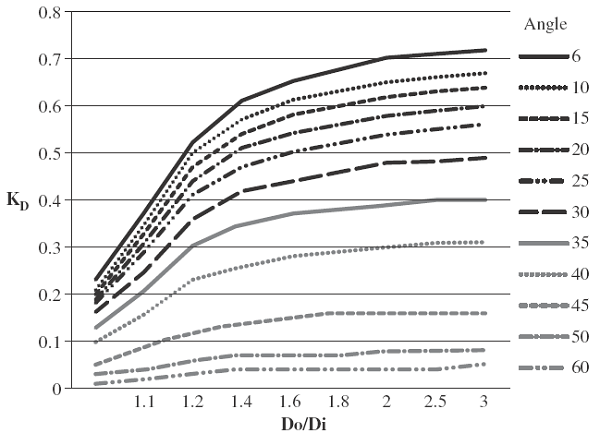Related Resources: calculators
Pipe Flow Gradual Size Enlargement Formula and Calculator
Fluid Flow Table of Contents
Hydraulic and Pneumatic Knowledge
Pipe Flow with Gradual Size Enlargement Formula and Calculator:
Gradual enlargement causes less energy loss than sudden enlargement because it causes less turbulence. Diffusers are gradual enlargement device. Velocity decreases while pressure increases. Gradual enlargements generally have a conical section that joins two different pipe diameters. The divergence angle is the included angle in the cone. The following two equations give approximations of head loss in a gradual enlargement. KL is the Gibson loss coefficient (see Figure 1).
KD is the resistance coefficient (see Fig. 2). Both depend on the ratio of areas and the angle of divergence. The formulas to calculate this loss ignore the effects of friction inside the conical section. If the enlargement is very gradual, the effects of friction can become significant. Therefore, an included angle of 6° or more is recommended in the conical section to mitigate the effects of friction. For area ratios up to 6:1 with angles of divergence of 40° or more, head loss may be less with a sudden expansion than with a gradual one. These two effects are clearest on the graph of KL (Figure 1).
Preview: Pipe Flow with Gradual Size Enlargement Calculator
hl = KD ( vi2 / ( 2 g ) ) Eq 1
hl = KL [ (vi2 - vo2 ) / 2 g ] Eq 2
where:
vi = velocity entering the enlargement,
vo = velocity leaving the enlargement,
hl = head loss in units of length,
KD = resistance coefficient see figure 2,
KL = Gibson loss coefficient see figure 1,
g = gravity (32.174 ft/sec2),
Head Loss Coefficient KL, Conical Diffuser
Table 1 (Click on image to enlarge)
Head Loss Coefficient KD, Conical Diffuser
Table 2
Related:
- Pipe Enlargement and Reduction Head, Heat and Minor Losses Formula
- Pressure Drop Along Pipe Length - Fluid Flow Hydraulic and Pneumatic
- Velocity and Flow Capacity of Oil Schedule 40 Pipe
- Flow Capacity Pipe and Tubes ANSI Schedule 40 Air
- Velocity and Flow Capacity of Oil Schedule 160 Pipe
- Hazen-Williams Equation for Pipe Friction and Pressure Drop - Fluid Flow Hydraulic and Pneumatic
- Pipe Flow Flow Rate and Velocity Equations and Calculator
Source: Machinery Handbook, 28th Edition

